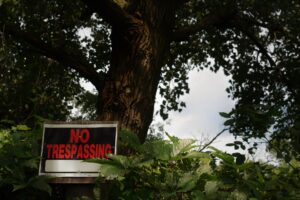Criminal Trespass
Have you been arrested for criminal trespass in Texas? A conviction for criminal trespassing can have serious consequences, including jail time, fines, and damage to your reputation from a criminal record. You need an experienced criminal defense attorney to help you protect your interests.
Contact the Law Office of Case J. Darwin, Inc. today for a free initial case evaluation to discuss your legal rights with a Texas criminal defense attorney. As a former prosecutor and briefing attorney for the Houston First District Court of Appeals, Case J. Darwin has significant experience with the Texas criminal justice system and courts. He uses his legal knowledge to advocate for clients facing criminal charges.
Criminal Trespassing Laws in Texas

Under Texas law, a person commits criminal trespass when they enter or remain on another party’s property without that party’s consent, and the person knew they were not supposed to enter the property or received notice to depart and failed to do so. The statute describes various means by which a property owner can notify people not to enter or to depart their property, such as:
- Fencing or enclosures
- Signs posted on the property or at an entrance
- Purple paint marks on trees or posts spaced no more than 100 feet apart on forested land or 1,000 feet apart on non-forested land
- The visible presence of crops grown for human consumption
Under the criminal trespass statute, a property owner may post a sign notifying visitors that the owner prohibits firearms on their property.
When Does Someone Commit an Act of Criminal Trespass?
Simply entering someone else’s land does not automatically constitute criminal trespass. Instead, a person commits the act of criminal trespass when they enter the property despite signs or other visual indicators that advise people that the property owner has forbidden entry to their property.
Criminal trespass also occurs when a property owner or their authorized representative informs a visitor that they must depart the property, but the visitor fails to do so. For example, a person may commit criminal trespass when they enter a fenced-in property.
Criminal trespass may also occur when a person enters someone’s private property while armed with a firearm despite notice that the property owner has prohibited firearms on their property.
What Should You Do After an Arrest for Criminal Trespassing?
After being arrested for criminal trespassing, you must exercise your rights to protect your interests. First, you should exercise your right to remain silent by firmly but politely advising the police officers that you wish to remain silent and don’t want to answer questions. You do not have to answer any questions the police ask about your criminal trespassing charges.
Next, you should advise the police that you want to exercise your right to legal counsel. You have the right to speak with an attorney before police questioning and to have a lawyer present if you choose to talk to the police about your arrest and charges.
Defenses to Criminal Trespassing Charges
Depending on the circumstances of your case, you may have various defenses to a criminal trespassing charge. Common defenses include:
- Lawful authority to enter property – Various people may have lawful authority to enter property even when an owner or tenant posts notices barring entry to the property. For example, law enforcement officers, firefighters, emergency medical technicians, postal/delivery workers, and utility technicians may lawfully enter the property during their job, even if a property owner has generally forbidden entry.
- Consent/authorization – You might defeat a criminal trespass charge by proving that you received permission to enter or remain on the property from the owner or another party authorized to consent.
- Lack of notice – You can also beat a criminal trespass charge by showing that the property did not have signs or other posted notices barring entry or that the property owner or other authorized party did not advise you to leave the property.
- Mistake of fact – You may defend against a criminal trespass charge by showing that you received permission to enter or stay on the property from a person you reasonably believed owned the property or had the authorization to consent to your presence on the property, even if that person had no such authority.
Penalties for a Criminal Trespass Conviction
Texas law grades criminal trespass as a misdemeanor offense. The grading of a criminal trespass charge will depend on the circumstances of an offense. Criminal trespass usually constitutes a Class B misdemeanor offense. However, the law grades criminal trespass as a Class C misdemeanor when the offense occurs on agricultural land within 100 feet of the property line or on residential land within 100 feet of a protected freshwater area. Criminal trespass may constitute a Class A misdemeanor if the offense occurs:
- In a habitation or shelter center, on a Superfund site, or in a critical infrastructure facility
- In an institution of higher education, when the defendant has a prior conviction for criminal trespass on the property of a higher education institution
- When the defendant possesses a deadly weapon during the offense
- On the property of a general residential operation operating as a residential treatment center
Penalties for a criminal trespass conviction in Texas include:
- Class C misdemeanor: Fine of up to $500
- Class B misdemeanor: Fine of up to $2,000 and up to 180 days in jail
- Class A misdemeanor: Fine of up to $4,000 and up to one year in jail
How Can a Criminal Defense Lawyer Help You Fight Criminal Trespass Charges?
Although Texas law considers criminal trespass a misdemeanor offense, you should treat an arrest for criminal trespassing seriously. A criminal defense attorney can help you protect your freedom and future from criminal trespassing charges by:
- Investigating your case to obtain evidence helpful to your defense
- Reviewing the facts and evidence to identify potential case strategies
- Explaining your charges, potential outcomes of your case, and the criminal justice process to you to prepare you for what to expect
- Fighting the prosecution’s case at each stage, including by moving to exclude evidence or dismiss your charges due to a lack of evidence
- Vigorously advocating your innocence at trial if you chose to contest your charges
Contact the Law Office of Case J. Darwin, Inc. Today to Discuss Your Criminal Trespass Charges
Following an arrest for criminal trespass in Hays County, get experienced legal help to protect your rights, freedom, and future. Contact the Law Office of Case J. Darwin, Inc., today for a free, confidential consultation to learn how a criminal defense attorney can help you face your charges and advocate for a favorable resolution of your case.
Image by Sharon Carr Licensed via Unsplash




